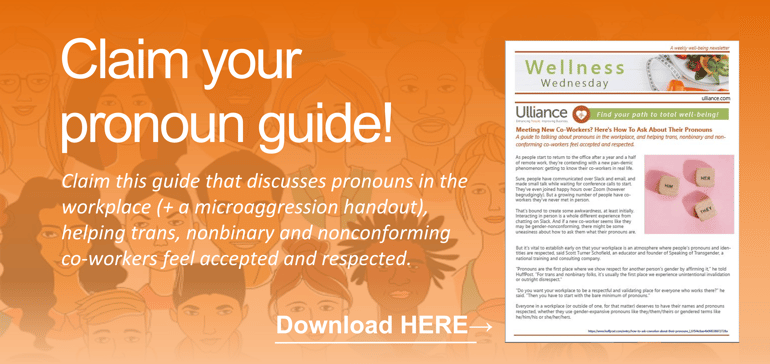You will spend about 82,652 hours at work over your lifetime if you live to be
at least 61 years old, the age of the average adult in the US. That is about 1/3 of your life.
Many employers now offer remote work, which has considerably widened the talent pool by opening opportunities to underrepresented groups. With such a significant focus on Diversity, Equity and Inclusion, informed and respectful communication is more important than ever.
Workplace discrimination happens. Whether it is intentional or not doesn’t change that it is discrimination. The best way to ensure it doesn’t happen at your business is to “get in the know.”
Ignorance and insensitivity are two of the main barriers to including non-binary individuals in the workplace. Colleagues may not appreciate the importance of using correct pronouns or may simply be uncomfortable.
Even HR leaders may not be familiar with the range of non-binary pronouns, but that just means it’s time to step up your game and practice by incorporating more pronoun usage in the workplace.
The What and Why of Gender Pronouns
Building a foundation of respect and belonging means each person feels genuinely accepted within their environment. The English language excludes everyone who does not fall under the umbrella of male or female, and one-in-five Americans (18%) personally knew someone who prefers a pronoun other than ‘he’ or ‘she’. 1 in 5 transgender and non-binary people also report having their pronouns respected by the important people in their lives.
Closing that gap is essential, and it begins with having empathy and understanding toward people who identify as non-binary.
Gender Pronouns
Pronouns help give us our identity and establish us as part of a group. A gender pronoun is a pronoun that specifically genders the person being referred to, e.g., she/he, hers/his.
Non-gendered Pronouns
People who are transgender or non-binary may use non-gendered pronouns, e.g., they/them/theirs.
Why Gender Pronouns Matter
A truly inclusive work environment is one where everyone feels comfortable being their authentic selves. They don’t have to censor their actions or ideas because they know they will not be judged.
This type of supportive environment allows everyone to thrive and, at the same time, increases both productivity and quality of work.

In June 2020, the Supreme Court found that discrimination because of someone’s transgender status is prohibited under sex discrimination. The Equal Employment Opportunity Commission (EEOC) issued guidance on the practical implications.
The guidance highlights one form of harassment that can contribute to creating a hostile work environment based on gender identity—misgendering.
What does it mean to misgender someone? It means ignoring how they identify and instead identifying them as you choose.
Some languages prioritize non-gender-specific pronouns, and some have no gender pronouns.
For example, let’s say your new employee Samuel, informed you during the hiring process that she was transgender and preferred to be called Sam but was not ready to come out.
On Sam’s first day in the office, employees:
• Repeatedly and intentionally refer to Sam using her male name and pronouns
• Asked her probing questions about her sexual orientation and anatomy
• Assigned her to a back-of-house role so customers won’t interact with her
• Prohibited her from using the women’s restroom
Misgendering in the workplace can support a hostile work environment claim, but under what circumstances? Suppose an employee makes an honest mistake or is completely unaware of the person’s gender identity. According to the EEOC, unintentional conduct won’t violate Title VII of the Civil Rights Act of 1964.
However, if intentional and repeated, misgendering can support a hostile work environment claim.
Top 3 ways to proactively foster an inclusive environment that will Help prevent misgendering by:
1. Being supportive - encourage productive communication about what name they want to go by and what pronouns to use. Also, talk to them about whether or not they choose to come out to coworkers, and if so, how you can support their decision.
2. Consistently using same name/pronoun usage – Use the proper name on all correspondence, including email, name tag, office directory and any other documents.
3. Training, training and more training - Train your workforce on always using correct names and pronouns when referring to employees. Any training should give employees a chance to practice using pronouns and a ‘script’ of how to correctly use non-binary pronouns.
Offer tips on how to ask non-binary individuals questions kindly. When approached with compassion and genuine concern for using the correct pronoun, thoughtful questions can show respect for gender identity.
Normalizing working with people who are LGBTQ+ isn’t just about legal compliance; it’s the right and respectful thing to do.
Workplace Inclusion vs. Workplace Acceptance
It may seem as though accepting non-binary employees’ status and pronoun use meets the requirements for creating a diverse workforce. But, this alone lacks warmth and sincerity and greatly hinders building a culture where everyone can feel welcome.
Being inclusive isn’t just about accommodating someone’s needs, and leaders must integrate those needs into the workplace system. Inclusive means management takes time to promote non-binary people’s connections to coworkers and ensures they don’t get left behind or left out.
From the company CEO to the last hiree, everyone in the organization should be on board and actively participate by listing their own pronouns and finding ways to incorporate non-binary language into everyday work life.
Doing so will make it natural for colleagues and managers and create an environment of inclusion and compassion for all employees.
When you partner with Ulliance, our Life Advisor Consultants are always just a phone call away to teach ways to enhance your work/life balance and increase your happiness. The Ulliance Life Advisor Employee Assistance Program can help employees and employers come closer to a state of total well-being.
Investing in the right EAP or Wellness Program to support your employees will help them and help you. Visit www.ulliance.com, or call 866-648-8326.
The Ulliance Employee Assistance Program can address the
following issues:
• Stress about work or job performance
• Crisis in the workplace
• Conflict resolution at work or in one’s personal life
• Marital or relationship problems
• Child or elder care concerns
• Financial worries
• Mental health problems
• Alcohol/substance abuse
• Grief
• Interpersonal conflicts
• AND MORE!
References
By Madeleine Collins, E. H. (2022, February 25). Building Belonging: Pronouns at Work. Retrieved from HR Daily Advisor:
https://hrdailyadvisor.blr.com/2022/02/25/building-belonging-pronouns-at-work/
https://www.threeearsmedia.com/hr-pronoun-guide.html. (2022). Pronouns In The Workplace: . Retrieved from Three ears media: https://www.threeearsmedia.com/hr-pronoun-guide.html
III, H. F. (2022, July 2022). Viewpoint: Consider Pros and Cons Before Requiring Pronouns in Signature Blocks. Retrieved from SHRM: https://www.shrm.org/resourcesandtools/legal-and-compliance/employment-law/pages/pronouns-in-signature-blocks.aspx
Pronouns and Misgendering: Answers to Common Questions from Employers. (2021, December 3). Retrieved from HR Daily Advisor: https://hrdailyadvisor.blr.com/2021/11/30/pronouns-and-misgendering-answers-to-common-questions-from-employers/

